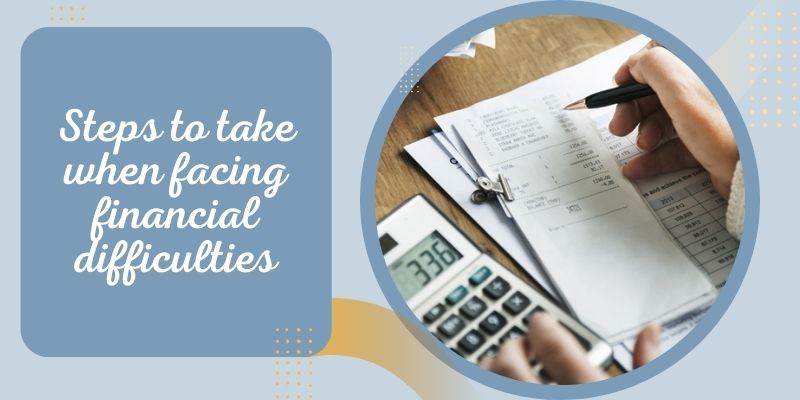Many customers are suffering with financial stress as they struggle to keep their money safe, prepare for the future, and simply try to make ends meet. This stress is being brought on by recent high-profile bank failures, sky-high inflation, and worries of a recession.
Although external circumstances are frequently to blame for financial stress, there are Steps to take when facing financial difficulties and take action to increase your financial security. You can manage your financial by following these seven Steps to take when facing financial difficulties. Let’s seao.info find out!
7 Steps to take when facing financial difficulties

1. Prioritize what you can control on discretionary spending
It’s likely Steps to take when facing financial difficulties impossible for you to change every aspect of your stress. Instead, concentrate on what you can control to make improvements to your circumstances. Think about your grocery budget, for instance. Consider strategies to reduce your shopping bill by a few dollars, such as comparing the costs of several brands. Not only will you save money, but the sense of control and success you’ll experience may also help you feel less stressed.
2. Find ways to earn more money
Steps to take when facing financial difficulties, You’ll want to be careful to not allow your limited budget add to your already high stress levels. Budget cuts can only be made so far. The greater than usual cost of consumer goods is definitely already putting pressure on the line items in your budget.
Instead, it could be a good idea to think about ways to increase your income. Some techniques for doing this include:
- Work a few additional hours: If you’re paid hourly or at least qualify for overtime compensation, try talking to your boss about putting in a few extra hours each week.
- Negotiating for a pay increase is possible given the high rate of inflation and the competitive job market.
- selling objects that you no longer require: This can contain goods like used clothing, furniture, toys, pet supplies, and tools.
- Getting a second job: People who are seeking for a flexible approach to complement their full-time income might think about doing so. This may entail running a blog or carrying out tasks like food delivery or tutoring. The money may really pile up when you take into account that, according to a Bankrate poll, the average and median monthly income from side gigs in 2022 was $996 and $400, respectively.
3. Pay essential bills

Steps to take when facing financial difficulties, According to a recent Bankrate survey, the majority of employed Americans (55 percent) claim that their income has not kept pace with the rise in household spending brought on by inflation. Prioritize vital bills first if you’re anxious about being able to pay all of your bills. Prioritizing your bills after going through them serves several purposes:
- You can find certain bills that you can cut or eliminate by carefully considering what you spend your money on.
- Prioritizing your bills might help you make sure you set aside enough cash to pay them all on time.
You can hopefully sleep better at night if you keep track of your payments and prioritize them. This will help you feel less stressed about money.
Payment extensions may be permitted by some service providers and lenders, giving you more time to pay your debt. When facing financial difficulty, this can be helpful. It’s crucial to read the fine print of any extension agreement to see whether additional costs will be incurred and how the extension will affect accrued interest.
4. Save money during trying times
Saving money on a regular basis might be challenging, especially if you’re already having trouble making ends meet. According to a study by Bankrate, 74% of people think economic reasons like inflation, rising interest rates, and changes in income/employment are currently forcing them to save less.
Making an emergency fund and sticking to your savings plan will not only make you feel more in control, but they will also reduce some of your stress.
It is worthwhile to shop around for the finest high-yield savings account because these accounts frequently generate yields that are exponentially larger than the near-zero rates frequently provided by large banks.
You can program an automated transfer from your checking account if you want to put a particular amount aside each month.
Any additional savings that you have after creating an emergency fund might be best placed in a certificate of deposit (CD). You will receive a guaranteed return rate for keeping your money in the account for a specific amount of time, which could be higher than with standard savings accounts.
5. Track your money-saving progress

If you don’t track it, you won’t really know if you’re making progress. Make sure you are aware of your position.
Monitoring your progress toward building your emergency fund over time might improve your wellbeing. In its Money and Mental Health Survey, Bankrate discovered that of all U.S. people who claim that financial worries have had a negative influence on their mental health, 41% said that having insufficient emergency savings has resulted in an increase in anxiety in recent months.
According to Cara Macksoud, a certified financial behavior specialist and CEO of Money Habitudes, a company that provides financial personality assessments, understanding your chances, options, and how your money is working for you really is the key to having excellent financial health and a positive outlook.
Continues Macksoud, “That check-in can be the spark for you to start doing so. Understanding your finances can enable you to determine what story your money is telling, if you don’t already have one.
6. Talk to your lenders
Steps to take when facing financial difficulties Debt burdens can be physical and psychological. Before letting debt and the stress it causes consume you, talk to your lenders.
Always remember that lenders are frequently eager to discuss your issues with you and come up with at least a short-term solution, suggests Anna Barker, a personal finance expert and the founder of the website LogicalDollar.
7. Consult with an expert financial advisor
To help relieve some of the pressure on your shoulders when it comes to things like making goals, saving money, and reducing debt, think about speaking with a financial counselor.
Steps to take when facing financial difficulties, According to Macksoud of Money Habitudes, “in times of stress, a financial advisor should be there to validate your feelings and show you why you should feel calm with the plan you have in place.” The ability to see where you were, where you are, and where you’re going is the best part of working with an advisor over a longer period of time.
Bottom line
Steps to take when facing financial difficulties, Nowadays, many people experience financial stress and worry, whether they are trying to make ends meet because of inflation or are concerned about the security of their bank accounts because of a number of high-profile bank failures.


